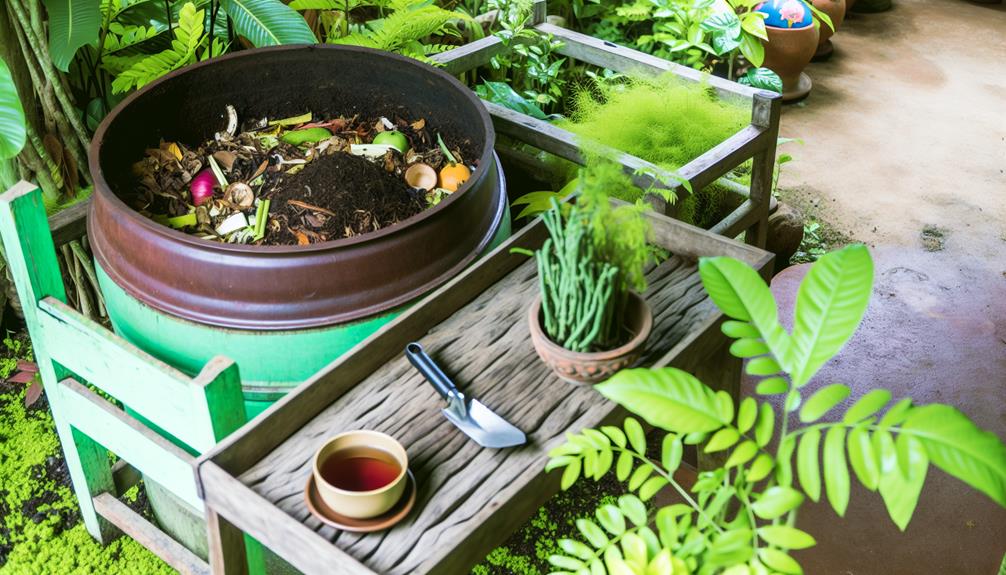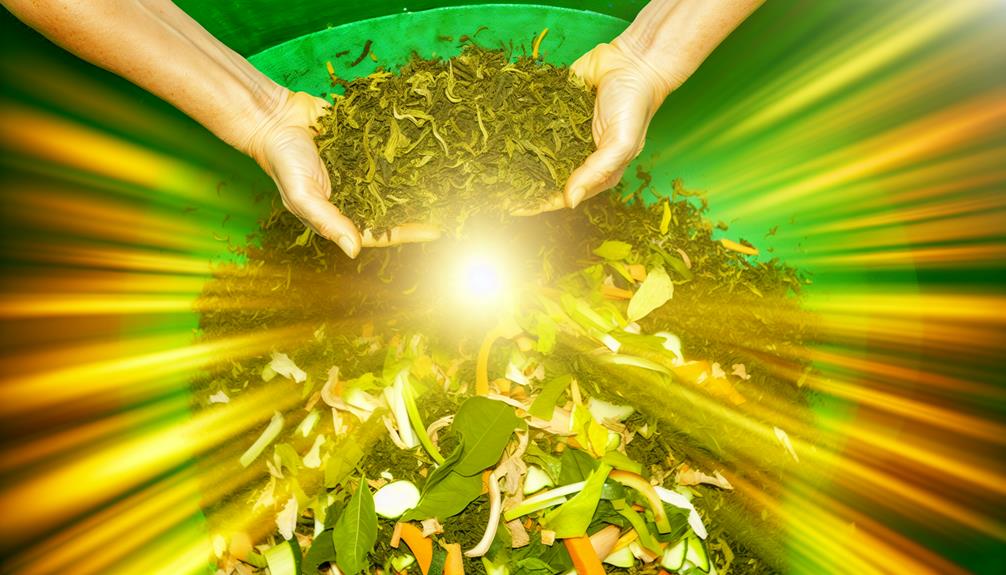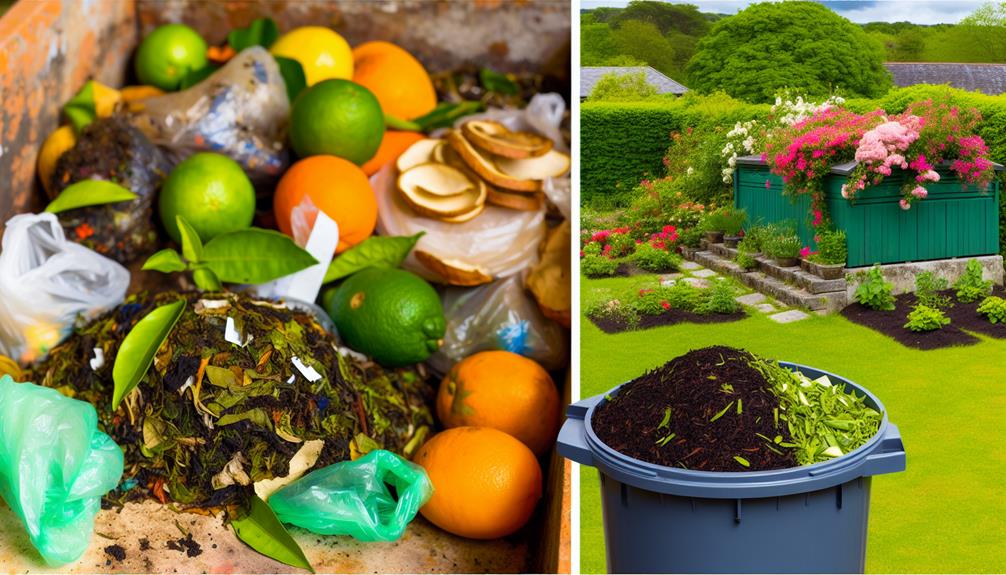

Yes, you can compost tea leaves. They offer rich nutrients like nitrogen to your compost and improve soil health. Dry the leaves to prevent mold, and mix them with other compost materials for a balanced pile. Be sure to remove any staples or plastic from tea bags first. Green and herbal tea leaves work well, breaking down rapidly and enriching the soil.
Don’t overload the pile and remember to balance greens and browns. Regularly turning the compost promotes even decomposition. For more detailed steps on optimizing your compost, there’s plenty more to explore.
Composting tea leaves enriches your soil with essential nutrients and organic matter. When you add spent tea leaves to your compost pile, you’re not just reducing waste; you’re also enhancing soil enrichment. Tea leaves are rich in nitrogen, which is crucial for plant health. By incorporating them into your compost, you’re providing a balanced diet for your plants, ensuring they grow strong and healthy.
To get the most out of composting tea leaves, mix them thoroughly with other compost materials. This helps to create a well-balanced compost pile. Make sure to include a variety of green (nitrogen-rich) and brown (carbon-rich) materials. Tea leaves fall into the green category, so you’ll want to balance them with items like dried leaves or straw. This combination accelerates decomposition and results in richer compost.
As the tea leaves decompose, they break down into organic matter that improves soil structure, water retention, and aeration. This leads to better root development and overall plant health.
When composting tea leaves, it’s important to know which types work best. Green tea leaves and herbal tea leaves are both excellent choices for your compost pile. Their natural compounds break down easily, enriching your soil with valuable nutrients.
Green tea leaves are an excellent choice for composting due to their high nitrogen content and rapid decomposition rate. When you’re finished with your tea brewing, don’t toss those used green tea leaves in the trash. Instead, add them to your compost pile. Green tea leaves are rich in nutrients that can enhance the quality of your compost, making it more beneficial for your garden.
To compost green tea leaves effectively, first make sure they’re free from any non-compostable materials like plastic tea bags. If you use loose green tea, you’re already a step ahead. Simply sprinkle the used leaves onto your compost heap.
These leaves break down quickly, integrating well with other compost materials. Make sure to balance them with carbon-rich items like dried leaves or cardboard to maintain a healthy compost ratio.
Herbal tea leaves, such as chamomile, peppermint, and rooibos, offer a diverse range of nutrients that can enhance your compost pile’s health. These herbal infusions break down easily and add valuable organic matter to the soil.
When you compost herbal tea leaves, you’re not just recycling waste; you’re enriching your garden with organic blends that can promote plant growth.
To get the most out of composting herbal tea leaves, consider the following tips:
Incorporating herbal tea leaves into your compost pile is a simple, effective way to improve soil quality. By composting these organic blends, you’re contributing to a healthier garden environment and promoting sustainable gardening practices.
Also Raed: Can You Compost Body Wash?
To prepare tea leaves for composting, make sure they’ve been thoroughly dried to prevent mold growth in your compost pile. Start by rinsing the leaves under cold water to remove any sugars or additives that might attract pests. This step is essential as it guarantees that only clean, organic material makes its way into your compost. After rinsing, spread the tea leaves out on a baking sheet or a clean towel.

Next, focus on drying the leaves. You can air-dry them by placing the baking sheet in a well-ventilated area, away from direct sunlight. This method may take a few days, but it’s effective and eco-friendly. If you’re in a hurry, you can use an oven set to a low temperature. Spread the leaves evenly on the baking sheet and place it in the oven for about 30 minutes, checking periodically to ensure they don’t burn.
Properly dried tea leaves will be crumbly to the touch and free of moisture. By taking these steps, you’re setting the stage for a healthy, mold-free compost pile. Now, you’re ready to move on to the next step in the composting process.
When adding tea leaves to your compost bin, remember they’re a nutrient-rich addition that can enhance your compost’s overall quality.
Mix the tea leaves evenly with other compost materials to guarantee proper decomposition.
Keep in mind that tea leaves break down relatively quickly, contributing to a faster composting timeframe.
Did you know that adding tea leaves to your compost bin can greatly enhance its nutrient content? When you incorporate tea leaves, you’re introducing valuable components that contribute to soil enrichment and make an excellent plant fertilizer.
Tea leaves are rich in nitrogen, which is important for plant growth. They also release minerals and other nutrients that can transform your compost into a powerhouse for your garden.
Here are some key benefits of adding tea leaves to your compost bin:
Begin by consistently adding your used tea leaves to the compost bin to guarantee they break down efficiently and contribute to the overall nutrient profile. Regularly incorporating tea leaves ensures a steady input of organic matter, which boosts the decomposition speed of your compost pile.
To maximize the benefits, mix the tea leaves with a variety of other compostable materials. Balancing greens (like tea leaves) and browns (such as dried leaves or cardboard) helps maintain the right moisture and aeration levels. Aim for a ratio of about 2:1, favoring the browns to avoid a soggy pile that could slow down decomposition.
Turning your compost every couple of weeks is important. This action introduces oxygen, essential for the microorganisms that break down the organic matter. Tea leaves, being small and moist, decompose relatively quickly—often within a few months—especially when mixed well with other materials.
Lastly, monitor the compost’s temperature. A well-maintained pile should feel warm to the touch, indicating active decomposition.
Also Raed: Can You Compost Bread Crumbs?
One common mistake to avoid when composting tea leaves is adding them in large clumps without breaking them up. This can lead to poor aeration and slower decomposition.

Additionally, make sure you’re not introducing plastic contamination from tea bags. Many tea bags have plastic components, which don’t break down in compost and can pollute your soil.
Here are a few more pitfalls to watch out for:
Also Raed: Can You Compost Cat Food?
Incorporating tea leaves into your compost can greatly enhance its nutrient profile and overall effectiveness. To get started, gather your used tea leaves and tea residue. Both are rich in nitrogen, which is essential for a balanced compost.
First, choose your composting method. Whether you’re using a compost bin, pile, or tumbler, tea leaves can be added directly. If you’re using tea bags, make sure they’re made from biodegradable materials; synthetic ones won’t break down.
Mix the tea residue thoroughly with other compost materials. This helps maintain a good balance of greens (nitrogen-rich) and browns (carbon-rich). Aim for a ratio of about 2:1 browns to greens. Tea leaves break down quickly, so they’ll help speed up the composting process.
For best results, layer the tea leaves with other compostable items like vegetable scraps, coffee grounds, and shredded paper. Turn the compost regularly to aerate it and promote faster decomposition. Keep an eye on moisture levels; tea leaves can retain water, so make sure the compost is moist but not soggy.
Yes, composted tea leaves can attract pests or rodents. For effective pest prevention, mix them well into the compost. Rodent deterrents like covering your compost with a lid or wire mesh can help you maintain a pest-free environment.
When selecting tea brands for composting, you should choose organic brands and pesticide-free options. This guarantees a healthier compost and demonstrates that you’re part of a community that values sustainability and the environment.
Tea leaves typically take about 3-6 months to fully decompose in compost. Their decomposition time can vary based on conditions, but they enrich your compost with valuable nutrient content, making your garden thrive and connecting you with nature.
You might worry about composting tea leaves affecting soil pH to a large extent, but it doesn’t. Tea leaves boost microbial activity and help maintain nutrient balance, fostering a healthy garden where everyone’s plants can thrive together.
Yes, you can compost both loose tea leaves and tea bags. Loose leaf benefits include faster decomposition. Check tea bag materials, as some contain plastic. Using compostable bags fosters eco-friendly habits, creating a sense of community.
So, you can definitely compost tea leaves. They add valuable nutrients to your compost, improving soil health.
Stick to organic, non-flavored varieties, and remember to remove any staples or strings. Mix them well with other compost materials to guarantee proper aeration.
Avoid adding too many at once, as they can become compacted. By following these tips, you’ll enhance your compost effectively, supporting a healthier garden.
